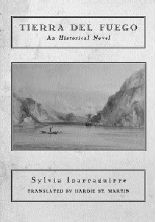The Truth at the End of the World
The charm of the Indian to me is that he stands free and unconstrained in Nature-is her inhabitant and not her guest-and wears her easily and gracefully. But the civilized man has the habits of the house. His house is a prison…
Henry David ThoreauJournal, April 26, 1841
Tierra del Fuego is a stunning tale as violent and troubling as the winds that lash the pampas and race through Cape Horn, where much of the action takes place. Based on an actual incident, Sylvia Iparraguirre’s scathing indictment of colonial arrogance, skillfully translated from the Spanish, recently won the Sor Juana Inés de la Cruz Prize, presented in Chicago during the national booksellers convention. It also won the “Best Book of the Year” award at the annual book fair in Buenos Aires, the most important book fair in Latin America.
Iparraguirre narrates the story of a 16-year-old Yámana Indian who was seized from his canoe in 1830 in reprisal for the theft of a whaleboat off an English ship. During the abduction, the ship’s captain rips five buttons off his coat and flings them into the canoe as payment for the boy, whom from then on is known as “Button,” Jemmy Button.

His captors claimed to be motivated by a desire to bestow upon the “savages”-three others were also taken-the blessings of “civilization.” After transporting them to England, instructing them in English and Christianity, and presenting them to the king, they were returned to their homeland, with what the English would later claim was the noblest of intentions: to rescue them from their barbaric ways. Back in Tierra del Fuego, they were placed in a little, English-style wooden cottage surrounded by a vegetable garden and provided with such indispensable implements as teakettles, knives, bedclothes and pitchers, in the hope they would serve as agents of civilization.
Their story has been told before, most notably by Charles Darwin, who refers to them briefly in Voyage of the Beagle, and by Robert Fitzroy, the Beagle’s captain. But it is through the eyes of Iparraguirre’s narrator, John William Guevara, that their story takes on epic proportions. When Guevara receives a letter from the British Admiralty, thirty-five years after the Button abduction, requesting information about the “ill-starred native,” he is driven to write about the shocking events he had observed. “For some reason I can’t fathom, my life story cannot be explained without his,” writes Guevara. The result, in the form of an extended letter, is reminiscent of those sea-faring sagas by Melville, C.S. Forester, Patrick O’Brien and Coleridge. Like the narrator in The Ancient Mariner he clutches at the sleeve of our imagination and compels us to hear him through.
We learn that Guevara’s Argentine mother, of good family and traditional values, had died, leaving his British father, William Scott Mallory, a former sailor and incorrigible drunk, to look after him. In order to teach his 10-year old son to read and write, Mallory emerges from his stupor so that “among uncivilized persons, like him I might enjoy its [education’s] benefits.” When the boy turns 17, his father commits suicide, leaving him to fend for himself. (The key figures in Guevara’s life often meet a violent end.) Thus, John travels to Montevideo and ships out on the Beagle. Its captain, impressed by the fair-haired Argentinean, well read and fluent in both English and Spanish, takes him under his wing and, following Button’s seizure, places the Yámana Indian in Guevara’s care. Guevara is the logical choice. He, too, is an outsider. Both are approximately the same age and hail from the same side of the world. In time, a strong bond will unite them: “[I]t was through him that I discovered the man I believed did not exist. And behind the man, a people with beliefs and spirit, with respect for life in all its forms, whom I had not known before and would not know again.”
Such a statement from the pen of Sylvia Iparraguirre is no surprise. Well known in Argentina for her human rights activism, she writes here in the voice of a 19th century sailor.
Today’s readers know that the devastation Guevara predicted-the systematic destruction of the environment, the violation of individual liberties and the breakdown of aboriginal societies-has come to pass. But the narrator’s prophetic and highly credible voice makes the story all the more timely, its message more poignant. While the outcome is inevitable, Iparraguirre whets our curiosity and leads us on. We read to discover not what will happen, but how it will happen.
From its inception, her account, like Tierra del Fuego itself, is shrouded in mystery and fog. From the safety of their ship, the British sailors swap stories about naked cannibals, their bodies smeared with paint and foul-smelling fish oil. “I could not have believed how wide was the difference between savage and civilized man,” writes Darwin in Voyage of the Beagle. “It is greater than between a wild and domesticated animal, in as much as in man there is greater power of improvement.” Nights in this inhospitable setting are pitch-black, impenetrable but for the tall fires, kindled by the natives, which illumine the shore and give the place its name, “Land of Fire.” The sailors call Button’s land “Teke uneka” but, as Jemmy explains to Guevara, the words actually mean, “I don’t understand what you say,” which was the natives’ response to the strangers’ interrogations.
Against the background of a land called “I Don’t Understand What You Say,” anything is possible. Events repeat themselves. Characters disappear and reappear. The story reels back and forth in time over a period of 35 years, crossing and re-crossing the globe from Argentina to England to Tierra del Fuego to the Falkland Islands. (A small map would have been helpful.)What distinguishes the novel are its ironies, enigmas and omissions, the techniques used to convey its message. The protagonist, who has “unknowingly adopted a double identity” is the son of two traditional enemies, an Argentine and an Englishman, who are at odds to communicate with each other. He uses his mother’s last name, rather than his father’s, and directs his letter to an Englishman, “Mr. MacDowell or MacDowness,” in response to a request that had been sent to “the Major.” (There is no such character.) At the same time, he confesses to drinking heavily, which casts doubt on his credibility. He ignores the questions he has been asked, writes in Spanish, a language the letter’s recipient would be unlikely to understand, and, as we soon learn, has no intention of sending his reply.
Yet despite-or perhaps because of-the double meanings, his account is not only convincing, but moving as well. We are struck by the speaker’s determination to reach the truth. As is often the case in seafaring stories, the protagonist is searching for something-sometimes many things-and Guevara is no exception. At the beginning, as a young sailor, he sets off on a quest for his past, his heritage and his dead father’s story. Thirty- three years later he tracks down Button, on trial in the Falklands for allegedly slaughtering a group of missionaries, in order to discover Button’s fate and the outcome of that first doomed voyage to Tierra del Fuego. Guevara’s last quest takes place in his 52nd year. He is driven from somewhere deep inside himself to give voice to the horrors he has seen in order to reach some sort of understanding and vindication. “One thing I know, the words good or bad that I set down on these sheets of paper without being forced to by anyone, have turned to me and are staring at me, waiting for an answer I don’t have.” He will find his answer, not to what happened, but to what must be done. Thus, the narrator’s voyages entail not only actual journeys from place to place, but also the passing from one realm of understanding into another.
While Guevara is a product of Iparraguirre’s imagination, the historical events are not, so one cannot help but ask whether the book recreates them faithfully. (I found several unimportant discrepancies with Darwin’s account.) However, in its portrayal of the evil men do, Tierra del Fuego comes closer to grasping the terrible outcome of the forces of civilization than could any chronological retelling of events. This brilliant and beautifully wrought work deserves to become a classic. It shares with all great literature the ability to capture the universal truths behind what really happened and will leave its mark.
Diana Anhalt is a writer and poet in Mexico City.



